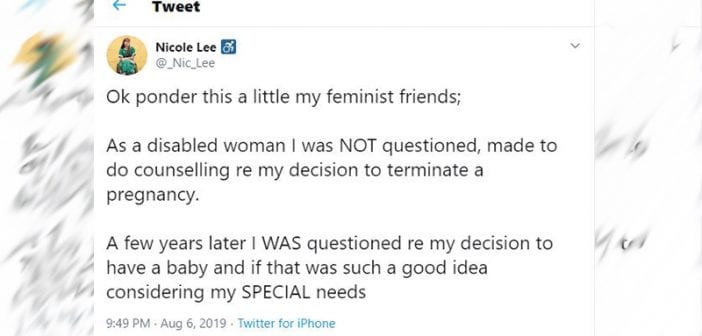An Australian woman recently spoke out against discrimination and eugenics in abortion, sharing her story of motherhood. Nicole Lee suffered a spinal cord injury at a young age and uses a wheelchair. Writing for Quartz, Lee shares that when she was pregnant, no one questioned her when she sought elective abortion. However, Lee also has two living children. When she chose Life for those babies, many people questioned her.
Lee writes that she already had a toddler when she became pregnant and considered abortion. When she sought an elective abortion for her second child, she says the choice “was seen unquestionably as the ‘right’ decision.” Noting abortion’s legacy of eugenics, she writes, “This view potentially stems from fears around passing on genetic disorders. It’s a fear that has its origins deeply rooted in eugenics, and what is subjectively deemed as whether or not a disabled person can live ‘a good life.’”
This unjust treatment is not an anomaly in the abortion industry, which was founded for the purpose of eliminating people not deemed “fit” to live. When subjective “quality of life” assessments become the standard for the Right to Life, every human life is threatened. No one questioned Lee’s decision to end her child’s life, but for other mothers with disabilities, the treatment is even more severe. Horrifically, in one recent case, doctors almost succeeded in forcing a disabled woman to undergo an abortion against her will.
Although no one seemed concerned when Lee chose to end a child’s life through abortion, when she became pregnant with a third child and chose Life, people’s reactions were much more intrusive. Many people had questions about how a woman with a disability could adequately mother her children. For Lee, the experience caused her to doubt herself. She writes, “Imagine you are about to welcome your second child into the world, and everyone is expecting you to fail.”
She says her family and close friends were supportive, but “People outside of my immediate family and circle of friends simply couldn’t see past my disability.”
Many other women with disabilities have had similar experiences. The article on Quartz originated with a short tweet last month. On Twitter, Lee wrote, “As a disabled woman I was NOT questioned, made to do counselling re my decision to terminate a pregnancy. A few years later I WAS questioned re my decision to have a baby and if that was such a good idea considering my SPECIAL needs.”
In the replies to her tweet, many women expressed similar experiences. One woman, who has a disability, said she has been told she “shouldn’t have kids at all because it wouldn’t be fair on [sic] my potential children.”
The experience of deadly discrimination that Lee suffered is one that is familiar to many families who have had a preborn child with a disability. Just as Lee’s disability caused people to question her quality of life and the quality of life of her preborn child, parents are often told that they should end the life of a child with a disability in the womb to “prevent suffering.” The difficulty is, abortion does not end suffering; abortion ends a human life, and shatters the lives around the injustice.
Despite her negative and troubling experience, Lee still considers abortion acceptable. Sadly, she does not see that the very worst part of her experience, being left utterly alone and unquestioned in her decision to end the life of her preborn child, is the essence of a mother’s so-called “right to choose.”
Lee writes that when seeking an abortion during a time of fear and uncertainty, “I expected to be offered counseling and treated with empathy and concern. But oddly, no one blinked an eye. No counseling. No questions. Further to this, no support was offered afterward.”
Lee views this as a reflection of the fact that she has a disability, but the fact is that many women are given no counseling and offered no resources when considering abortion.
Comparing her experience of being questioned after choosing Life, Lee poignantly asks, “Why wasn’t I asked about my ability to cope after having an abortion? Why was no one concerned about my welfare then?” These are questions that apply not only to mothers with disabilities but to all mothers. Every child, whether the child may have a disability or not, deserves Life.

